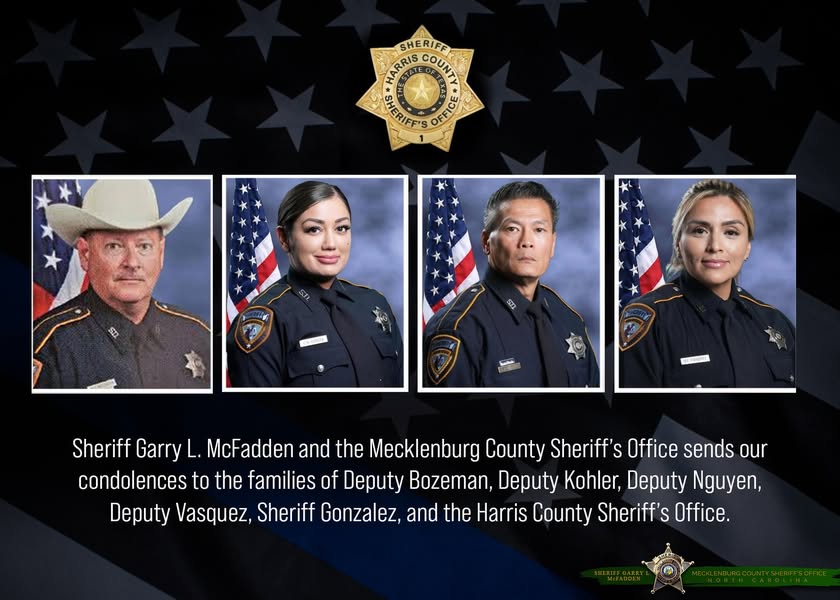The recent passing of former Harris County Sheriff’s Deputy William Bozeman has brought to light the critical issue of mental health within law enforcement communities. Bozeman’s death by suicide marks the third such tragedy among current and former deputies in the Houston area within a span of just six weeks, underscoring the profound challenges faced by those who serve and protect.
Deputy Bozeman’s career with the Harris County Sheriff’s Office (HCSO) was marked by dedication and service. While specific details about his tenure remain private, his commitment to law enforcement reflected a broader narrative of officers confronting daily stressors and traumatic experiences inherent to the profession. The cumulative exposure to such challenges can significantly impact mental well-being, a concern that has become increasingly evident within the HCSO.
In addition to Bozeman, the HCSO has mourned the losses of Deputy Christina Kohler and former Deputy Maria Vasquez. Deputy Kohler, aged 37, was reported missing and later found deceased on March 13, 2025. She had been with the department since 2018, most recently serving in the courts division. Just days later, former Deputy Vasquez, who had departed the department in December 2024, also died by suicide. These consecutive tragedies have deeply affected the law enforcement community and prompted urgent discussions about mental health support.
The alarming frequency of these incidents has highlighted the pressing need for comprehensive mental health resources within law enforcement agencies. Dr. Thomas McNeese, director of the HCSO Behavioral Health Division, acknowledged the profound toll that policing can take on individuals. He emphasized that officers are often exposed to critical incidents at a rate far exceeding that of the average citizen, which can lead to significant psychological strain over time. Dr. McNeese advocates for proactive engagement with mental health services, stating, “It’s OK to not be OK, but it’s not OK to not do something about it. You don’t want to stay stuck there.”
The HCSO has initiated several measures to address these concerns. Established in 2020 under Sheriff Ed Gonzalez, the Behavioral Health Division offers peer-to-peer support and integrates mental health services throughout the department’s operations. Despite these efforts, the recent suicides have prompted internal evaluations of existing programs and discussions on how to enhance support for deputies. The division currently comprises three master’s-level clinicians and three psychologists, though staffing remains a challenge in meeting the growing demand for services.
The stigma surrounding mental health in law enforcement remains a significant barrier. Historically, officers have been hesitant to seek help due to fears of professional repercussions or perceptions of weakness. Paul Bruce, a commander with the HCSO, highlighted past departmental overreactions to officers seeking assistance, which fostered a culture of mistrust. He recounted personal experiences, noting that his brother, also a law enforcement officer, died by suicide after struggling with stress and potential PTSD.
Addressing this crisis requires a multifaceted approach. Law enforcement agencies must prioritize mental health by fostering an environment where seeking help is normalized and encouraged. This includes expanding access to confidential counseling services, implementing regular mental health check-ins, and providing training to recognize signs of distress among colleagues. Additionally, involving family members in mental health initiatives can offer a broader support network for officers.
Community support also plays a vital role. Public awareness campaigns can help destigmatize mental health issues and highlight the unique challenges faced by law enforcement personnel. Collaborative efforts between agencies, mental health professionals, and community organizations can lead to the development of tailored programs that address the specific needs of officers.
The tragic loss of Deputy William Bozeman and his colleagues serves as a somber reminder of the urgent need to address mental health within law enforcement. By acknowledging the problem, reducing stigma, and providing comprehensive support, we can honor their memories and work towards a future where officers have the resources and encouragement to seek help when needed.
If you or someone you know is struggling with mental health issues, resources are available. In the United States, the National Suicide Prevention Lifeline offers confidential support 24/7 at 1-800-273-TALK (8255). In the United Kingdom, the Samaritans can be reached at 116 123. Seeking help is a courageous step towards healing and resilience.



